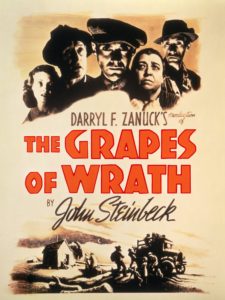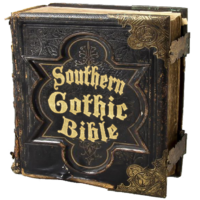In the Southern Gothic Dust Bowl Classic The Grapes of Wrath the Joad clan, introduced to the world in John Steinbeck’s iconic novel, is looking for a better life in California. After their drought-ridden farm is seized by the bank, the family — led by just-paroled son Tom (Henry Fonda) — loads up a truck and heads West. On the road, beset by hardships, the Joads meet dozens of other families making the same trek and holding onto the same dream. Once in California, however, the Joads soon realize that the promised land isn’t quite what they hoped.
 The Grapes of Wrath is a 1940 American drama film directed by John Ford. It was based on John Steinbeck‘s 1939 Pulitzer Prize-winning novel of the same name. The screenplay was written by Nunnally Johnson and the executive producer was Darryl F. Zanuck.
The Grapes of Wrath is a 1940 American drama film directed by John Ford. It was based on John Steinbeck‘s 1939 Pulitzer Prize-winning novel of the same name. The screenplay was written by Nunnally Johnson and the executive producer was Darryl F. Zanuck.
The film tells the story of the Joads, an Oklahoma family, who, after losing their farm during the Great Depression in the 1930s, become migrant workers and end up in California. The motion picture details their arduous journey across the United States as they travel to California in search of work and opportunities for the family members.
The film is widely considered to be one of the greatest American films of all time. In 1989, this film was one of the first 25 films to be selected for preservation in the United States National Film Registry by the Library of Congress as being “culturally, historically, or aesthetically significant.”
According to The New York Times, The Grapes of Wrath was America’s best-selling book of 1939 and 430,000 copies had been printed by February 1940. In that month it won the National Book Award, favorite fiction book of 1939, voted by members of the American Booksellers Association. Soon it won the Pulitzer Prize for Fiction.
 In 1962, the Nobel Prize committee said The Grapes of Wrath was “great work” and one of the committee’s main reasons for granting Steinbeck the Nobel Prize for Literature.
In 1962, the Nobel Prize committee said The Grapes of Wrath was “great work” and one of the committee’s main reasons for granting Steinbeck the Nobel Prize for Literature.
While the film is somewhat stark, it has a more optimistic and hopeful view than the novel, especially when the Joads land at the Department of Agriculture camp – the clean camp. Also, the producers decided to tone down Steinbeck’s political references, such as eliminating a monologue using a land owner’s description of “reds” as anybody “that wants thirty cents an hour when we’re payin’ twenty-five,” to show that under the prevalent conditions that definition applies to every migrant worker looking for better wages.
Tom Joad seeks a new world and to join the movement committed to social justice. He says:
I’ll be all around in the dark. I’ll be everywhere. Wherever you can look, wherever there’s a fight, so hungry people can eat, I’ll be there. Wherever there’s a cop beatin’ up a guy, I’ll be there. I’ll be in the way guys yell when they’re mad. I’ll be in the way kids laugh when they’re hungry and they know supper’s ready, and when the people are eatin’ the stuff they raise and livin’ in the houses they build, I’ll be there, too.
As the family moves on again, they discuss the fear and difficulties they have had. Ma Joad concludes the film, saying:
I ain’t never gonna be scared no more. I was, though. For a while it looked as though we was beat. Good and beat. Looked like we didn’t have nobody in the whole wide world but enemies. Like nobody was friendly no more. Made me feel kinda bad and scared too, like we was lost and nobody cared…. Rich fellas come up and they die, and their kids ain’t no good and they die out, but we keep a-coming. We’re the people that live. They can’t wipe us out, they can’t lick us. We’ll go on forever, Pa, cos we’re the people.


